Are Sub and Chain really this good? Is PoNY really just okay? And what can a Utah team do at Nationals?
October 20, 2021 by Edward Stephens in Preview with 0 comments
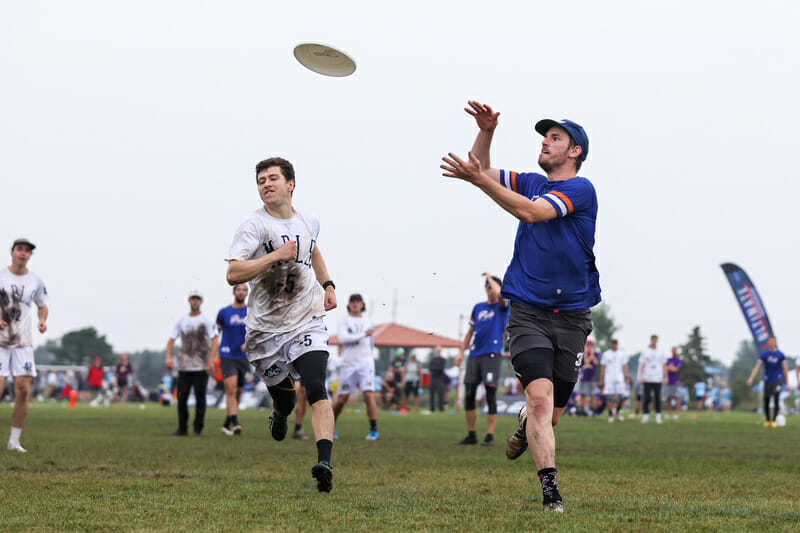
Ultiworld’s 2021 coverage of the club men’s division is presented by Spin Ultimate; all opinions are those of the author(s). Find out how Spin can get you, and your team, looking your best this season.
Pool A Preview — Pool B Preview — Pool C Preview — Competition Schedule
As always, the top three teams in Pool D are seeded dangerously close to one another, while the overall bottom seed in spot four is playing with little to lose. But this year’s brew of #8 Minneapolis Sub Zero, #5 Atlanta Chain Lightning, #9 New York PoNY, and #16 Utah Killjoys feels exceptionally volatile. Both Sub Zero and Chain Lightning have followed up on last seasons’ flashes of giant-toppling potential with 2021 records that suggest they could run deep in the bracket this year if they keep clicking at the right moments, while not-so-long-ago national champions PoNY have stumbled against elite competition so far, and only have so much time to put it together with all the pieces in one place. Meanwhile, as a first-time Nationals program with a blue-chip name or two at the top, a lot of young energy through the ranks, and many enthusiastic regional fans who’d like to see them succeed, the Killjoys aren’t so unlike their 16-seeded counterparts in the women’s division, and will look to live up to their name with an upset that ends one of the senior teams’ bracket hopes on Day One. Welcome to the Pool of Death.
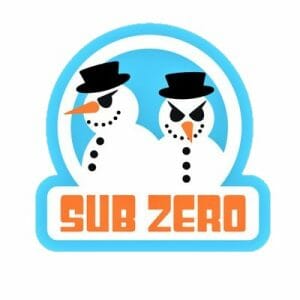
Minneapolis Sub Zero
Seeding: Overall No. 4, D1
Power Ranking: #8
Overall 2021 Record: 13-3
Against the Nationals Field: 3-2
Against the Pool: 1-1 vs. Chain-Lightning, 1-0 vs. PoNY
Sure, #13 Boulder Lotus and the Killjoys are great stories, coming into existence and immediately crashing the party in San Diego. But if we’re talking about surprises, we have to talk about the way Minneapolis Sub Zero have played so far in 2021. Posting a winning record against the Nationals field and earning an overall no. 4 seed after losing the likes of Ryan Osgar, Nick Simonelli, Josh Klane, and Jason Tschida from the offense and a complete set of top-tier Madison transplants (and Codi Wood) from the defense is astounding.
Don’t call it a rebuild. The best work is being done by Sub Zero veterans stepping up to stardom or stepping into the roles vacated by the old guard’s departure. Nick Vogt, who had a very good 2019 season, has upped his game enormously, to the point that he now ranks among the top handful of receivers in the game. Andrew Roy and Tony Poletto have taken over much of the old Klane-and-Tschida handling duties with hardly a hiccup. And, somewhere along the way, Charles Weinberg has learned to do a pitch-perfect Osgar impression, whipping up perfect mid-range benders to the end zone off of his unders.
The primary stopper remains Charlie McCutcheon, whose sublime footwork and positioning against every opponent’s most dangerous player have made him into a poster child of the your-favorite-player’s-favorite-player type. Tristan Van de Moortele reprises his role guiding the D-line offense after a turn — although that unit has lost a bit of its punch on the throwing side of things without Wood. All of that has led to wins over poolmates PoNY and Chain at the US Open, as well as #5 Washington DC Truck Stop. Not too shabby.
You have to wonder, though, how deep the talent goes with this team. Chain Lightning and PoNY can both alternate two full D-lines without suffering much of a drop-off in quality. It remains to be seen whether Sub can match them in that regard on what is sure to be a grueling Thursday. The other question mark here is the team’s ability to push itself in clutch moments. Even with 2019’s talent, Sub Zero couldn’t make it out of quarters at that year’s Nationals. Not that there was much shame in dropping a game to eventual champions #1 Seattle Sockeye, but at some point, you have to find a way to dig in and prevail if you want to push through to Saturday and Sunday. The kids are more than all right — but are they enough?
Likely Ceiling: Semifinals
Likely Floor: Done on Day One
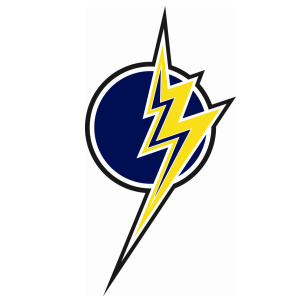
Atlanta Chain Lightning
Seeding: Overall No. 5, D2
Power Ranking: #4
Overall 2021 Record: 13-3
Against the Nationals Field: 3-3
Against the Pool: 1-1 vs. Sub Zero
The basics here are simple. This season’s Atlanta Chain Lightning team are the best in a decade, and they are making a push for semis or better this weekend. Good wins at the US Open — the kind they weren’t getting many of over the last few seasons — over Truck Stop, #6 Portland Rhino Slam!, and poolmates Sub Zero support that position. So does a strong performance in what ultimately ended up as a two-point loss in the Southeast Regionals final to #3 Raleigh Ring of Fire.
Yes, folks, we have a real contender on our hands. Now: how did Atlanta get to this point, and how strong will they be, really, in the crucible of the bracket?
How they got their groove back isn’t such a sexy story. There wasn’t a single moment that everything clicked, just a long process of rebuilding after a few truly subpar seasons. They’ve benefitted from picking up top talent along the way, like John Stubbs in 2019 and Antoine Davis this season, but it takes more than a couple of players with championship-winning experience to turn the mindset of an entire 27-person roster toward the kind of expectation of excellence necessary to sustain a deep run at Nationals.
Well, that isn’t exactly right. There was one red-letter moment of teambuilding: scoring Florida stalwarts Andrew Roney and Bobby Ley just before the Series. Roney made the cut for the most recent US Men’s National team; he can slot into any position on any line for Chain. And Ley finally gives the team what they’ve been missing: a true center handler to stabilize an offense that is otherwise chock-full of mids who have been having to take turns staying back until now. “His ability to break the mark and huck from standstill really allows our offense to be more dynamic,” says Chain captain Michael Fairley. Fairley cites Karl “Endzone” Ekwurtzel, Davis, and Stubbs as O-line athletes who are going to get more chances to do what they do best — win matchups one-on-one — thanks to the new recruits.
On defense, Chain bring their club version of the “Grits” zone that found a lot of success this summer for the AUDL’s Atlanta Hustle. But their matchup coverage isn’t any easier to play against, thanks to some stellar stoppers. Jakeem Polk, Patrick Dougherty, and Bradley Seuntjens should spend the tournament giving their opponents’ go-to athletes and handlers plenty of trouble.
Chain have talent, depth, strong coaching, and a good mindset. What they don’t have is much in the way of recent big-game experience, which could prove a liability. Let’s say they’re locked at 10-10 against Machine in quarters. Machine have been there before; Chain haven’t. Would Atlanta be able to stave off the jitters and trust in themselves well enough to prevail? What about a game against Sub to decide the pool on Thursday? It’s moments like those when a team can transmute its huge potential into proof — or not.
Likely Ceiling: Finalists
Likely Floor: Prequarters
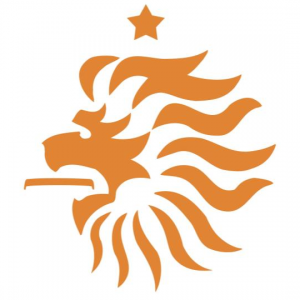
New York PoNY
Seeding: Overall No. 9, D3
Power Ranking: #9
Overall 2021 Record: 23-7
Against the Nationals Field: 9-7
Against the Pool: 0-1 vs. Sub Zero, 1-0 vs. the Killjoys
To say the 2021 season has been a bumpy one for New York PoNY is a gross understatement. Taking a hard line on semi-pro participation when they were forming the roster may have cost them some of the best talent in the sport: Jack Williams, Ryan Osgar, and Jeff Babbitt all elected to play for the AUDL’s New York Empire rather than suit up for the local club; now Williams and Osgar are going to the dance in San Diego with #3 Raleigh Ring of Fire, while Babbitt couldn’t quite break #21 Philadelphia Phantom out of Mid-Atlantic Regionals.
Pro-Elite Challenge went well enough until they ran into the Sockeye buzzsaw. Consecutive losses at the US Open to Rhino Slam, Sub Zero, and #11 SoCal Condors were worrisome; an 0-for-Saturday at Pro Champs was nothing short of disastrous. It wasn’t only their results. The team just didn’t look very good. How can a team with title aspirations hope to reach their goal after a run of tournaments like that? The 2018 Championship team and the 2019 semifinalists both had strong Triple Crown Tour results ahead of the Series. It was hard to see how the 2021 team, performing well below those standards, could hope for a similar finish.
But there was an important caveat about the summer: the team just didn’t have all of their pieces. Star cutter Grant Lindsley was hurt for a while. Ben Jagt and Marques Brownlee managed to find a compromise that allowed them to play for the Empire and PoNY. Conrad Schloer came out of the woodwork at the last minute. And as a complete team? They rolled. The video from Northeast Regionals of their games against Nationals qualifiers #14 Boston DiG and #17 Amherst Sprout might as well be footage of a cakewalk. PoNY were once again smooth, confident, intelligent, precise, coordinated, and explosive in the way we’ve come to expect.
The offense, now that it’s all the way assembled, benefits from having six starters who are all extremely comfortable in the backfield: Jimmy Mickle, John Randolph, Chris Kocher, Harper Garvey, Sean Keegan, and Sam Little.1 The level of versatility this set-up allows is going to be extremely hard to game-plan against. Who do you stick your ace handler-defender on?
Jack Hatchett, meanwhile, has been leading the defense all year long, both before and after the turn. But that whole unit has been given a big leg up from the additions of Lindsley (from the O-line), Brownlee (since the AUDL season ended), and, in particular, Schloer. “Conrad is a world-class defender who changes the way we can match up with other team’s top players. He’s also a tremendous teammate who brings positivity, experience, and confidence to the team — we’re super stoked to have him back in PoNY colors,” said team captain Isaac Saul.
Still, it isn’t all roses for the Pride of New York. As good as they looked at Regionals, both DiG and Sprout are on the lower-end of the Nationals spectrum. Chain and Sub Zero will be tougher assignments, and the Killjoys pack a punch, too. Plus, even with all the roster augmentations, it’s hard to ignore the regular season performances. Saul, acknowledging the team’s earlier struggles, puts a positive spin on it: “It gave some down-roster guys really great reps against the best players in the country, and it taught us as a team that we have to bring a huge amount of focus and intensity to win the games we know we can win,” he said. “Anything less in this division isn’t good enough.”
Likely Ceiling: Semifinals
Likely Floor: Prequarters
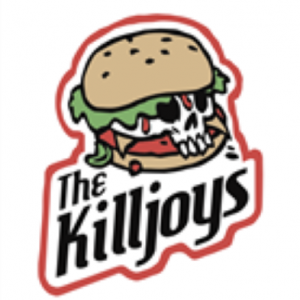
Utah Killjoys
Seeding: Overall No. 16, D4
Power Ranking: #16
Overall 2021 Record: 18-4
Against the Nationals Field: 0-4
Against the Pool: 0-1 vs. PoNY
You know what? Good for Utah. It’s about time the youth scene that so many organizers, coaches, and players have been building for years there begins to pay dividends. The Utah Killjoys pull from the whole spectrum: area coaches, students at BYU, Utah, Utah State, and Utah Valley, several high schoolers, and a guy who’s been living all over the world for the last ten years. They represent an area that, up to now, has been absent from the highest levels of club competition.
But don’t think that means they’ll just walk around Southern California wearing happy-to-be-here grins. “The goal on Thursday is to get to Friday,” said coach Bryce Merrill. “We know each of the three teams in our pool expect to win [it], and rightfully so. So we can’t really circle one game as the must-win game to sneak into a prequarter. We’ll have to play each game like it’s our elimination game.”
That’s a tall order for a team without a great deal of big-game reps. “Our teammates with the most tournament bracket experience are probably the four high school kids2 who made it to the semis and final of YCCs [with Utah Swarm],” said Merrill. He joked about having to wait for them to finish AP Biology homework before they were allowed to lead the team through a mental preparation call and getting visualization tips via TikTok, but it was the kind of joking that underscores the seriousness of the problem behind it. The Killjoys’ relative newness to this sort of stage has led to problems with consistency against other Nationals-level clubs. You only have to look at their Northwest Regionals footage against Sockeye and Rhino Slam to see the difference between teams who have been there before and teams who haven’t.
Their long suit, however, is sheer talent. Jordan Kerr has (deservedly, given his career to date) the most name recognition, but he’s hardly an every-other sort of player for Killjoys. The O-line can score if he doesn’t touch the disc. Taylor Barton is plenty powerful as both a thrower and a cutter, and the Yorgasons, Luke and Chad, have a lot of chemistry with everyone from years of youth and college play. And they have some big, athletic defenders with hair-trigger bid reflexes. That means they are going to earn several break chances every game.
Merrill says they’ve simplified the playbook as a bid to juice a little more efficiency from both the offense and defense. Will it be enough to shock one of the three heavy favorites seeded above them? It’s still a long shot for the Killjoys. But it would be extremely unwise for any team to overlook them.
Likely Ceiling: Prequarters
Likely Floor: Done on Day One